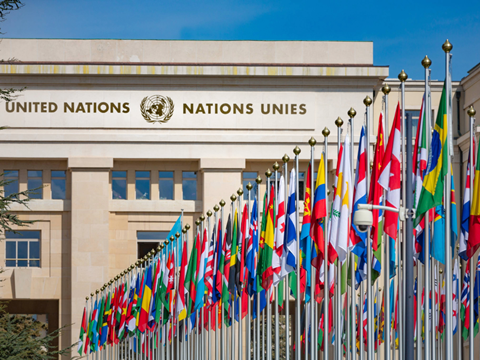
The sixth round of Global Plastics Treaty negotiations begins today, and WWF asks whether a continued push for consensus will slow its progress even further – or whether ambitious nations might branch off in pursuit of stronger sustainability measures.
Negotiations are currently taking place at the Palais des Nations in Geneva, and will continue until 14th August. Discussions will centre around the Chair’s Text, developed by INC Chair Luis Vayas Valdivieso, which was previously critiqued for its stance on bans or phase-outs of the ‘most harmful’ plastics and chemicals of concern, whether design requirements should be optional or mandatory, and expectations for countries to fund the transition away from plastics.
According to WWF, almost one hundred countries are set to back an ambitious treaty, with nations expected to submit proposals on bans and phase-outs, product design, and decision-making at the future Conference of Parties – i.e., Articles 3, 5, and 20 of the Treaty.
However, no agreement was reached over the Treaty’s terms at INC-5 in Busan last December – an outcome largely blamed on ‘obstructionism’ and lobbying, with a minority of countries allegedly seeking to water down the treaty in support of their petrochemical industries.
“The last five rounds of treaty negotiations have attempted to be inclusive and arrive at key decisions by formal consensus,” says Zaynab Sadan, Global Plastics Policy Lead at WWF. “However, with the Swiss talks billed as the last round of negotiations, something must give if we are to conclude a meaningful treaty.
“While the blocker countries say they want to build agreement, in reality they are demanding consensus as a way to compromise and water down ambition.
“Essential treaty measures, such as bans on certain products and chemicals and limits on production, already enjoy majority support, but countries banking on profiting from continued plastic production consider them a threat.”
If the sticking points from Busan remain difficult to overcome, WWF highlights that other options are available. Sadan first points to voting as a potential solution – explaining that the same solution was used in negotiations for the UN Convention on the Law of the Sea, the Arms Trade Treaty, and the Treaty on the Prohibition of Nuclear Weapons.
“Voting allows the majority to move forward while leaving the door open for others to join later,” she explains. “Voting embodies the spirit of multilateralism, facilitating collaboration to solve shared problems, even when not everyone agrees at first.”
Alternatively, countries with a shared vision of an ambitious treaty could take the text to this year’s United Nations General Assembly, where they can pursue its targets on their own.
“It is naive to think that more talking at the upcoming round in August will result in radical shifts towards unanimous agreement,” adds Sadan. “So countries must decide: keep seeking consensus and agree on a weak treaty, or be ambitious and forge their own path.”
As of 2025, WWF’s Global Plastic Navigator suggests that 133 countries support all of WWF’s ‘must-haves’ for the Global Plastics Treaty – global bans and phase-outs, harmonized plastic product design requirements, financial and technical support for developing countries, and the ability to strengthen the treaty over time. Another 37 countries are said to support some of those measures.
WWF’s stance is that “negotiators must not settle for just any treaty – a treaty that is dictated by the lowest common denominator will be a weak one and never include the measures that the majority of countries want, and people and nature need.”
For an in-depth rundown of the first five negotiating sessions in Punta del Este, Paris, Nairobi, Ottowa, and Busan, take a look at our ultimate guide to and comprehensive summary of INC-5.
In the run-up to this month’s negotiations, WWF and the University of Birmingham published a report connecting micro- and nanoplastics to impacts on environmental and human health, including disrupted food production, cancer, and infertility. It highlights these impacts as urgent reasons to make progress on a Global Plastics Treaty.
The International Court of Justice’s ruling that any country failing to tackle greenhouse gas emissions and fossil fuels is violating international law and might be required to pay reparations has also stirred up optimism that an ambitious treaty is within reach.
If you liked this story, you might also enjoy:
The ultimate guide to the Packaging and Packaging Waste Regulation in 2025
How are the top brands progressing on packaging sustainability?
Everything you need to know about global packaging sustainability regulation in 2025
The key to increasing the use of reusable packaging in supermarkets














No comments yet